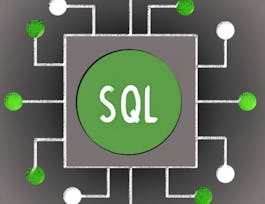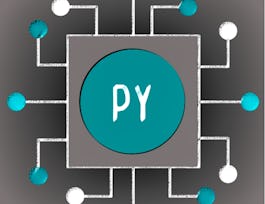In this fourth course of the Python, Bash and SQL Essentials for Data Engineering Specialization, you will build upon the data engineering concepts introduced in the first three courses to apply Python, Bash and SQL techniques in tackling real-world problems. First, we will dive deeper into leveraging Jupyter notebooks to create and deploy models for machine learning tasks. Then, we will explore how to use Python microservices to break up your data warehouse into small, portable solutions that can scale. Finally, you will build a powerful command-line tool to automate testing and quality control for publishing and sharing your tool with a data registry.



Web Applications and Command-Line Tools for Data Engineering
This course is part of Python, Bash and SQL Essentials for Data Engineering Specialization



Instructors: Noah Gift
4,186 already enrolled
Included with 
(35 reviews)
Recommended experience
What you'll learn
Construct Python Microservices with FastAPI
Build a Command-Line Tool in Python using Click
Compare multiple ways to set up and use a Jupyter notebook
Skills you'll gain
Details to know

Add to your LinkedIn profile
17 assignments
See how employees at top companies are mastering in-demand skills

Build your subject-matter expertise
- Learn new concepts from industry experts
- Gain a foundational understanding of a subject or tool
- Develop job-relevant skills with hands-on projects
- Earn a shareable career certificate


Earn a career certificate
Add this credential to your LinkedIn profile, resume, or CV
Share it on social media and in your performance review

There are 4 modules in this course
In this module, you will learn how to install and run Jupyter on your local machine. Additionally, you will explore strategies to use code and text cells in a Jupyter notebook.
What's included
8 videos4 readings1 assignment1 discussion prompt3 ungraded labs
In this module, you will learn how to create and use a Cloud-based notebook in Google Colab and AWS Sagemaker.
What's included
6 videos4 readings7 assignments1 ungraded lab
In this module, you will learn how to build a Python Microservice with FastAPI and deploy a containerized machine learning Microservice for data engineering.
What's included
11 videos7 readings4 assignments1 ungraded lab
In this module, you will learn how to organize a Python project so you can build a powerful command-line tool. You will use Click, a useful command-line tool framework to enhance your tool. Finally, you will automate testing and quality control for publishing and sharing your tool with a registry.
What's included
25 videos11 readings5 assignments5 ungraded labs
Offered by
Recommended if you're interested in Data Management

Duke University

Dartmouth College

Dartmouth College

Duke University
Why people choose Coursera for their career




Learner reviews
Showing 3 of 35
35 reviews
- 5 stars
54.28%
- 4 stars
31.42%
- 3 stars
8.57%
- 2 stars
2.85%
- 1 star
2.85%
Reviewed on Feb 15, 2023
New to Data Management? Start here.

Open new doors with Coursera Plus
Unlimited access to 7,000+ world-class courses, hands-on projects, and job-ready certificate programs - all included in your subscription
Advance your career with an online degree
Earn a degree from world-class universities - 100% online
Join over 3,400 global companies that choose Coursera for Business
Upskill your employees to excel in the digital economy
Frequently asked questions
Access to lectures and assignments depends on your type of enrollment. If you take a course in audit mode, you will be able to see most course materials for free. To access graded assignments and to earn a Certificate, you will need to purchase the Certificate experience, during or after your audit. If you don't see the audit option:
The course may not offer an audit option. You can try a Free Trial instead, or apply for Financial Aid.
The course may offer 'Full Course, No Certificate' instead. This option lets you see all course materials, submit required assessments, and get a final grade. This also means that you will not be able to purchase a Certificate experience.
When you enroll in the course, you get access to all of the courses in the Specialization, and you earn a certificate when you complete the work. Your electronic Certificate will be added to your Accomplishments page - from there, you can print your Certificate or add it to your LinkedIn profile. If you only want to read and view the course content, you can audit the course for free.
If you subscribed, you get a 7-day free trial during which you can cancel at no penalty. After that, we don’t give refunds, but you can cancel your subscription at any time. See our full refund policy.

